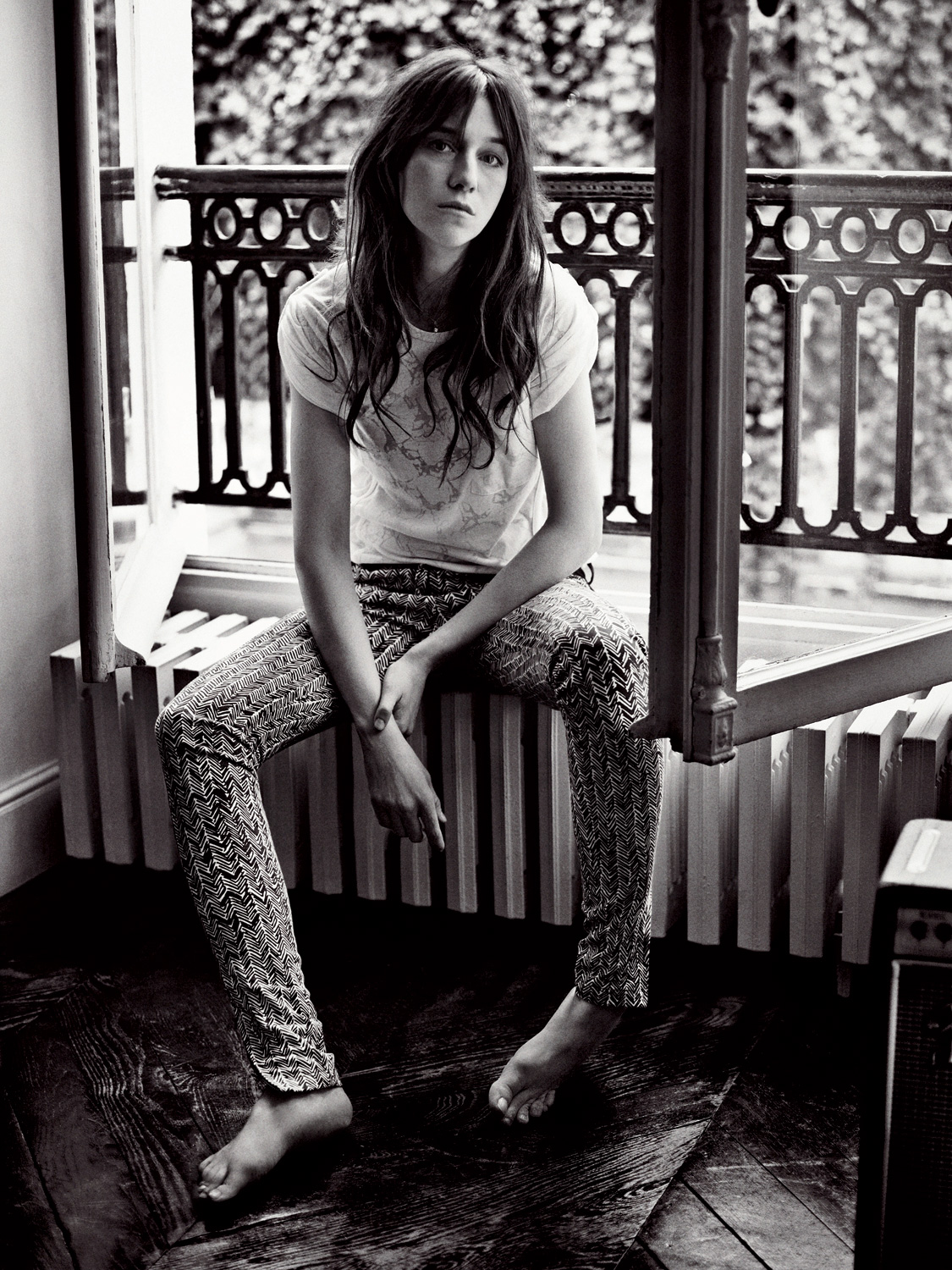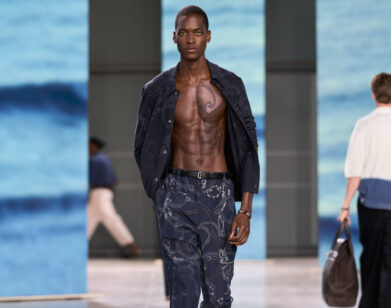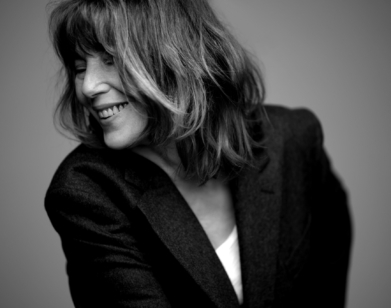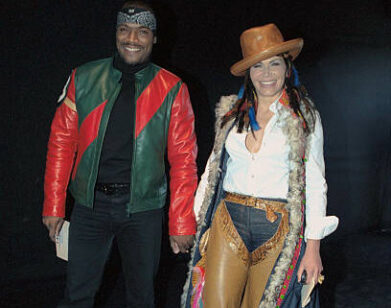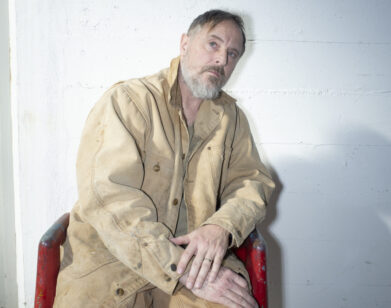Charlotte Fever: A Look Back at Charlotte Gainsbourg
Like a favorite pair of blue jeans, the cabaret was a place where people felt comfortable. To celebrate their 10-year anniversary, Hudson Jeans have adopted this free-spirited mentality with the launch of the “Hudson Cabaret” —a tribute to pushing past the boundaries and living a life free of inhibition. Always a fan of self-expression, anniversaries, and bon-vivant, Interview searched our archives for our favorite moments with the most rebellious and denim-loving subjects; those who stray from the usual rules of society and “let themselves go.”
A singer, actress, fashionista, and charming Parisienne (an art in its own right), Charlotte Gainsbourg has thrice graced the pages of Interview. Following in her famous family’s footsteps (her mother is “that bag” Jane Birkin and her father is sultry French singer Serge Gainsbourg), Charlotte has released three successful albums in the last six years, and braved three Lars Von Trier films with an astonishing fourth in the works. Here’s a compilation of our favorite moments with Charlotte the singer, Charlotte the actress, Charlotte for Ever (an eponymous album she recorded with her father at age 15), and the most graceful composite of the three, Charlotte Gainsbourg herself:
HOMETOWN: Paris, France
AGE: 41
FAMILY IN SHOWBIZ: Musician Serge Gainsbourg (father), actress Jane Birkin (mother), singer and actress Lou Doillon (sister), musician Lulu Gainsbourg (brother)
EARLIEST SONG RECORDED: “Lemon Incest” alongside Serge Gainsbourg
SCARIEST ACTING MOMENT: There’s always one moment where you’re scared because you have to dive in—but it can be anything. In Melancholia, the last scene was one of the most difficult things I had to do. We shot it the first time with three actors: Kirsten Dunst, the little boy [Cameron Spurr], and myself. We did the scene, and Lars put on the Wagner music, and it was all going very well, and we did a few takes, and in the end he came to me and said, “I’d like to do another close-up on you tomorrow morning and maybe the next day, just to have different reactions. I don’t know what I want, but you can put yourself in whatever state you need.” And then it was horrible. It’s a bit like filming an animal documentary—you know, when you’re waiting for the moment. I didn’t know what he wanted, what kind of pain he wanted. That was terribly difficult and terrifying because I didn’t know when it was going to stop. I didn’t know when he was going to push me. So we did it two more days in a row, and, yeah, that was a nightmare. [Charlotte Gainsbourg by Dimitri Ehrlich, December 2011]
DADDY’S GIRL: He’s very present in my mind even if I’m not doing music. [Charlotte Gainsbourg by Brendan Lemon, October 2006]
PARTNER, YVAN ATTAL: He’s the person I admire most, and who I want to please most. [Charlotte Gainsbourg by Gena Rowlands, October 2001]
GROWING UP: We had a lovely life. We went to private school. But they had quite an eccentric life, going into nightclubs and coming back when we got up to go to school. That was kind of weird. But apart from that, we had a very normal life. [Charlotte Gainsbourg by Dimitri Ehrlich, December 2011]
LA VILLE-LUMIÈRE vs. THE CITY THAT NEVER SLEEPS: Unfortunately, you get used to it [Paris]. Sometimes we see the beauty of it, but we tend to see beauty of New York more than Paris right now. For example, the light in New York, for films at least, is much more interesting than Paris’. And it’s exciting to shoot there, because there is so much going on all the time. [Charlotte Gainsbourg by Gena Rowlands, October 2001]
DEPRESSIVES WITH CHILDREN: …they have nothing to lose. When you’re in such a bad state, you’re wishing for the end of the world. So once it comes, there’s no panic. I understand that when you have everything to lose—when you have children—then you go into a panic and it’s unbearable. [Charlotte Gainsbourg by Dimitri Ehrlich, December 2011]
THE ART OF LYING: Of course we lie very well, but we’re very truthful. Even in a film when I pretend to have an emotion, the emotion is real. Even if I pretend the end of the world is coming, I do believe it when I’m doing it. [Charlotte Gainsbourg by Dimitri Ehrlich, December 2011]
WHEN TO SAY NO: [Lars Von Trier] asked me if I would be okay taking turns in a sex scene with two shots—in one, instead of Willem Dafoe it was with a porn actor. Lars asked me if it would be okay to be in the same shot with him, and I didn’t see why it would be a problem, so I said okay. And then it went on, and it was just becoming a porn film for me because Willem wasn’t there anymore. I was in a different film, and it was strange. Then he asked me to do another shot, and that’s when I said, “No, I can’t do it.” And he understood very well. [Charlotte Gainsbourg by Dimitri Ehrlich, December 2011]
DEALING WITH FEAR: I’m quite tough—I don’t feel that much pain, and I don’t feel scared about death. And suddenly I was becoming this fragile little thing that was scared every minute of dying, of getting a new hemorrhage in my head. That panic continued until Antichrist. It was such a release to be able to work and put my head into something that was stronger than my own little fears and problems. That film was very helpful. I just needed to push everything aside. [Charlotte Gainsbourg by Dimitri Ehrlich, December 2011]
SHY CHARLOTTE: A lot of actors are shy. With music, I had to push myself to do live shows because it was really the opposite of who I was. Still, I got such a kick out of it. I think that’s what I love the most: when I have the impression that I have a limit and that I’m pushing myself a little bit. [Charlotte Gainsbourg by Dimitri Ehrlich, December 2011]
AMERICANS IN PARIS: In music and films, Americans have a cultural monopoly. We can’t forget about it—it’s always there. So people are a bit angry because French culture is a bit forgotten. [Charlotte Gainsbourg by Gena Rowlands, October 2001]
ON “LEMON INCEST”: It was a very pure song about the love of a father toward his daughter and a daughter toward her father. The title was provocative, but the actual words that we sang are something very, very innocent. So I understood it that way. I love my father very, very much, and he loves me, and we just said so in the song. I didn’t even notice that there was a scandal afterward because I was in a boarding school in Switzerland, so nobody was aware of that. I mean, it didn’t harm me. [Charlotte Gainsbourg by Dimitri Ehrlich, December 2011]
ON WORKING WITH LARS VON TRIER: I think it’s a legend that he’s such a tough person to work with. I really didn’t experience any of that. Of course, he’s difficult in the sense that what he asks for is difficult. For my part in Antichrist, I suffered a bit. But it was the part—it wasn’t him. He wasn’t cruel. On the contrary, he was very kind. You know what you’re up for when you read the pitch. [Charlotte Gainsbourg by Dimitri Ehrlich, December 2011]
ON SCIENCE OF SLEEP: Making the movie was like being a child again and playing. A child has to pretend things. I know we always do this as actors, but this was more a childish game with deep feelings. [Charlotte Gainsbourg by Brendan Lemon, October 2006]
ON SINGING SERGE’S SONGS: …it’s impossible because the words are really the words of a father. It’s not a portrait of myself, so I couldn’t sing any of those, even if I do like them. [Charlotte Gainsbourg by Dimitri Ehrlich, December 2011]

